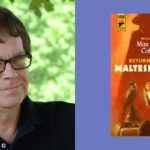
On Bad B&Bs, Writing As a Single-Parent, and the Presidential Elections
Talking with Lydia Millet, in Advance of Her New Novel
Lydia Millet describes herself as a “writer and conservationist,” which might sound effete, except that she works at the Arizona-based Center for Biological Diversity. That combination of high-concept and boots-on-the-ground works to describe Millet’s novels, as well: She’s written about subjects from a pompous president to magically real mermaids to now, a creepy tale of marital disconnect, Sweet Lamb of Heaven. She juggles accessible plots and nuanced characters with complicated ideas—to great effect. I conducted an interview with her via email and was delighted when she wrote that she’d gone on at some length because my questions were so interesting.
Bethanne Patrick: How and when did this book’s central conceit about, simplistically, voices in the head, come to you?
Lydia Millet: I don’t remember exactly, but I remember saying to my friend, the writer Jenny Offill, “I have the worst idea for a book! It’s the single-worst idea for a book I’ve ever had!” She said, “Pray tell.” Her own ideas are rarely bad. I said, “See, there’s a baby. And God speaks through it! It’s a terrible idea, isn’t it? I can’t wait to write it.” I elaborated a bit, and Jenny encouraged me. That’s what friends are for.
BP: Do you consider this your most “commercial” novel, as several reviews have either stated or implied?
LM: I tried to sell out early in my career, with a novel called George Bush, Dark Prince of Love that was published by Scribner in 2000. And when I say sell out, I just mean sell. Since then I never write with an eye toward sales. Writing anything other than exactly what I desire to write, in fiction, at a given moment—it’s just not why I’m in this racket. That said, if this book were to be deemed commercial, I’d be delighted. My publisher and my agent both deserve to make some dollars off me. Rare is the writer who doesn’t want to be read.
BP: Your protagonist Anna’s stalker husband Ned is scary from the get-go, but he becomes positively evil by the novel’s end. He’s like a combination of Sarah Palin, Donald Trump, and Ted Cruz. You could not have had all of this election-primary information while you were writing, but this character springs from a lot that already exists in this country. Could you discuss?
LM: The novel’s partly about how politics uses religion, how the powerful manipulate the pious for their own narrow ends. It’s one of the deep American tragedies that Christianity has been turned against itself for the sake of a small minority’s profit and privilege. I wanted to write about that, the cooption of authentic religious faith by kingmakers on the right, and I wanted to do it as a personal story in a suspenseful form. There’s a kind of supernatural conceit in this book, but as you say there’s plenty that’s firmly grounded in realism. In the real world, right-leaning U.S. voters have two choices this season: a billionaire demagogue who’s actively rewarded for his ignorance of governance and a religious extremist whose alarming, obscure ideologies are hardly even being examined by the media or the electorate. This election cycle’s giving us some of the ugliest and most bottom-feeding rhetoric we’ve seen in a while. It’s so over the top it can seem like a bad joke, but of course the stakes are high so it’s a deadly serious game. And it’s been in the making for ages, which is how I was able to write a book, begun years before this public spectacle, that played across the same field.
BP: Sweet Lamb of Heaven takes place mostly on the edge of a seaside bluff in Maine. What’s your relationship with Maine, if any? How about motels? I was fascinated by your motel proprietor Don’s café and its lively evenings.
LM: I love motels. And hotels. Anything but B&Bs, since having to make small talk with friendly strangers over breakfast is, I’m pretty sure, one of the nine circles of hell. B&Bs are in the Inferno somewhere, aren’t they? Maine I’ve been to only twice, but I loved it too. The motel in the book is modeled a bit after one I visited in Orono, though the book motel is on the ocean and the real motel was on a river. I’m more of an ocean person, when it comes to bodies of water. I live in a desert, but there’s the splendid Sea of Cortez only four hours’ drive away. Most of my books are set in Southern California; everyone needs a vacation from L.A. sometimes. The story of this book isn’t the story of California culture. So I set it in two places I find beautiful, Alaska, where I’ve spent more time, and Maine.
BP: Could you talk about the title and the weird toy that ties in to it?
LM: That’s a mother-in-law story. Well, ex-mother-in-law, and she’s no longer with us. But when she was, she gave just such a lamb to my daughter. For those who haven’t read the book yet, it’s a stuffed lamb with a recorded child’s voice reciting: “Now I lay me down to sleep / I pray the Lord my soul to keep / If I should die before I wake / I pray the Lord my soul to take.” My daughter was a baby at the time, so unlike the little girl in the story she didn’t offer an opinion about the lamb or the voice. But like the little girl, my then-husband and I promptly removed the battery-powered voice box. We were, frankly, frightened by it.
BP: Your narrator Anna intersperses her story with bits and pieces of research about language, communication, groups, animals, storytelling—and quite a few of her squibs come from Wikipedia. Is that a comment on how we learn now? What else?
LM: I like the crowd-sourcing of Wikipedia, though it has pitfalls. And it can be misused. But so could old-fashioned encyclopedias. They also had significant flaws. I’ll often go to Wikipedia first, to feel the pulse of something—an idea or a body of knowledge or a trend or a person or other animal—and then go elsewhere to research further. I think Wikipedia is a good barometer of how we learn and don’t learn at once. We skim the surface of things, and this gives us certain kinds of understanding and diverts us from others. It’s the glittering surface of a deep sea. But that glittering surface can’t be dismissed.
BP: Quite a few reviews have called this a novel about “paranoia.” Is it paranoia if they’re really out to get you? How, though, is this book different from your others?
LM: The narrator refers to paranoia quite expressly, so that’s fair to say, content-wise. There’s a dash of paranoia in there. But also legitimate fear. You don’t have to believe in conspiracy theories for them to exist, just as you don’t have to believe in God for God to exist or climate change for climate change to exist. Conversely, obviously, the fact that you do believe in something doesn’t make it exist. Except for in you. In your mind. And that’s a nontrivial exception. Our subjective realities tend to have an outsize influence on the physical world. For instance: say enough Americans deny climate change to allow a majority of their elected representatives to also deny it. Say America’s in a position of world leadership. Say it fails to lead in this clearly physical, fairly objective realm because those elected representatives, at the behest of industry and with the collusion of their constituents, refuse action at a crucial tipping point. Say a certain livable future is foreclosed because of this refusal. That’s a pretty clear causal chain.
As to the second question—I think all my books are different from each other, making my name hard to brand. A challenge for publicists! This one embraces the domestic thriller genre more, formally, than most of my other books embrace any genre beyond the general/literary, but it’s still idea-based, still argumentative. It still wishes to instigate a conversation.
BP: Not every writer can create believable children. Lena is a believable child, as well as a sympathetic child. Comments?
LM: I’m glad! My daughter has a friend named Lena, a lovely girl, and though the character’s not based on her, except for the name, it’s fair to say she’s a sympathetic, even admirable child, and so is my daughter. I’m not a person who likes children just because they’re children, though like all parents I suffer from positive bias when it comes to my own; I’d make a piss-poor elementary school teacher. Some children really get on my last nerve. Like some adults. So I’m relieved to hear this made-up one doesn’t get on yours.
BP: One of the ideas your eerie ending calls up is the damage we can do when we interfere or attempt to interfere with another person’s consciousness. Could you talk about that?
LM: There’s a massive invasion of mental privacy in the offing. The leap from handheld devices we’re constantly holding to devices contained in the body isn’t that big—plus it’s unclear whether devices even need to be “implanted,” though I like that paranoid language, to intrude upon our minds in ways the species hasn’t seen before. We’re profiled wherever we go in the virtual world, constantly connected to inputs tailored to our preferences as consumers. And the stream of “new” information is nonrandom, since it’s customized by algorithms to fit preferences we’ve already expressed, which means we’re exposed, on a daily basis, to our own personal status quo—a constant reinforcement of what we were yesterday, last month, last year. This has been widely discussed but still not widely enough, because it stands to have a far-reaching impact on our capacity to learn, grow, or change. You might say the invasion has occurred without resistance: the eagle has landed. We’re being colonized. So far that’s seemed borderline trivial to many people, though a small minority is horrified. Or if not trivial at least a fair exchange; we’re exploited as consumers, but we feel we get convenience and ease in return. Streamlined access to information and products.
But tech is always finding new inroads. Where will we draw the line? It’s not clear we’ll draw any line at all. Selfhood is at risk. Individualism is already quaint.
BP: How do you work? When do you work? What totems, if any, are essential to your process?
LM: No totems, except for the one with a keyboard and a screen. For the past decade or so I’ve had to write my fiction in small, snatched pieces of time, which I don’t recommend either for efficiency or peace of mind. I have a 30-hour-a-week day job and two children. No spouse. So no one would wish for my writing routine.
But if anyone’s looking for general tips, I’d say, stay single or at least stay childless; if you insist on procreation, find a stay-at-home partner wishing to do nothing but take care of your offspring, cook, clean, and as a bonus, if possible, possessing competence in the realms of carpentry, plumbing and electrical work. This is a tip for women in particular. Many men have already sussed it out, some of them centuries ago, and cleverly found such a partner, handily freeing them up to make their art.
I’ve discovered living in the country to be a plus. If you can telecommute, do it. City life is faster and harder. Life flashes by among the tall buildings.
BP: Who are your influences? Which of your contemporaries do you read, and/or which books are you excited about reading in the near future?
LM: I read opportunistically these days and tend to stop reading a book if I feel it’s not offering me enough pleasure or something new. I’d like to see more of the new.
BP: Is there a book you would kill to have written?
LM: No, I’m the nonviolent type. Though there may be one I’d be willing to die to write.
BP: What can you share about your next book, if anything?
LM: I’m working mostly on short stories now, for a change. There’s one inspired by Sid Vicious, one by Billy Bragg, one by the Marquis de Sade. De Sade has been a minor obsession since high school, when I did a presentation on him in my philosophy class. We had a great teacher who let us read anything, and I remember a handout I put together for my talk that contained passages from 120 Days of Sodom. It was mostly black rectangles, with the obscenities redacted.
Bethanne Patrick
Bethanne Patrick is a literary journalist and Literary Hub contributing editor.



















